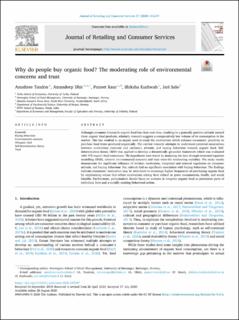Why do people buy organic food? The moderating role of environmental concerns and trust
Journal article, Peer reviewed
Published version

Åpne
Permanent lenke
https://hdl.handle.net/11250/2739834Utgivelsesdato
2020-08-28Metadata
Vis full innførselSamlinger
Originalversjon
Journal of Retailing and Consumer Services. 2020, 57 (November), 102247 10.1016/j.jretconser.2020.102247Sammendrag
Although consumer interest in organic food has risen over time, resulting in a generally positive attitude toward these organic food products, scholarly research suggests a comparatively low volume of its consumption in the market. This has resulted in an urgent need to study the motivations which enhance consumers’ proclivity to purchase food items produced organically. The current research attempts to understand potential associations between motivations (intrinsic and extrinsic), attitude, and buying behaviour towards organic food. Self-determination theory (SDT) was applied to develop a theoretically grounded framework which was evaluated with 378 organic food consumers. The hypotheses were tested by analyzing the data through structural equation modelling (SEM), wherein environmental concerns and trust were the moderating variables. The study results demonstrate the significant influence of intrinsic motivation, integrated and external regulation on consumer attitude, and buying behaviour. But, attitude had no significant association with buying behaviour. The findings indicate consumers’ motivation may be stimulated to encourage higher frequencies of purchasing organic food by emphasizing values that reflect motivations arising from ethical or green consumerism, health, and social benefits. Furthermore, policymakers should focus on avenues to integrate organic food as permanent parts of individual lives and a socially exalting behavioral action.
